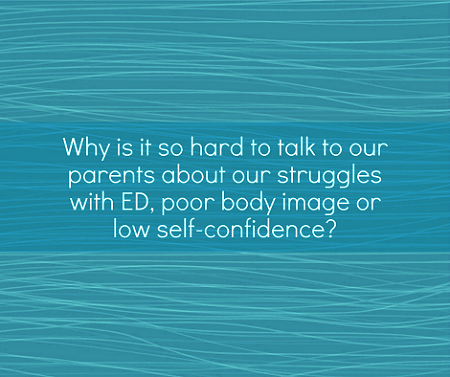Why is it So Hard to Discuss Body Image with Parents?
Why is it so hard to talk to our parents about our struggles with ED, poor body image or low self-confidence? Guilt and shame probably play a pivotal role in why we don’t want to talk about these things with Mom and Dad.
First of all, eating disorders are very secretive things, and while they may give us a feeling of superiority or liberation, we soon find ourselves coming down from that high and crashing into guilt and shame. Even those who don’t have an eating disorder may find the prospect of opening up about their negative body image a shameful ordeal. This becomes even more stressful when faced with the everyday barrage of picture-perfect Instagram profiles and other social media accounts that tell us we should be happy, bubbly and confident all the time.
Fear and anger are two other emotions that might hold us back from discussing body image with our parents. We might fear that our parents, upon hearing our concerns about weight, food and appearance, might not respond in an empathetic and gentle manner. Parents’ reactions can range from outrage to denial and anxiety, among others. We could also fear “letting them down,” and being a disappointment to our parents for having a problem that some people would consider petty. On the other hand, our feelings surrounding our negative body image may bubble up in anger and resentment towards our parents. It could be easier to blame our poor self-esteem and body image concerns on mom and dad, even if they didn’t knowingly contribute to it.
Yet some people just find it weird to talk to their parents about body image. Telling your dad about the stress you feel when trying on swimsuits is not exactly the most natural conversation. Still, our parents were the ones who (most likely) raised us, taught us right from wrong, and provided unconditional love that still continues to this day. So, why can’t we just open up to them about these issues?
It’s natural to want to break away from your parents and try to live a life independent of them. Most of us would much rather have important and deep conversations with our close friends or even some other family member instead of our moms and dads. Even so, most of us would agree that we long to receive comfort, attention, and advice from our parents, so here are some ways to get the conversation flowing.
1. Start off with simpler topics.
If you don’t really talk to your parents much, then jumping right into body image and self-confidence can be a bit jarring. Maybe start with how things are going at work or school before getting to the heavy stuff.
2. Be honest about what you need.
Do you want your parent(s) to simply be a sounding board so you can vent your thoughts and feelings? Or are you genuinely seeking their advice? Knowing what you want from them can help you start the conversation.
3. Think before you speak.
Prior to the discussion, mentally go over what you want to say. Identify the feelings you have, why the issue is bothering you, and why you’ve come to your parent(s) to talk. Remember that disagreements may happen, so try to keep calm and focus on how you feel, rather than throwing complaints and accusations at your parents.
4. Keep it up!
Being in regular contact with your parents could not only help you deal with the issue you’re facing, but it may strengthen your relationship as well.
Of course, these tips won’t work for everyone all the time, but it’s always nice to try. If talking to your parents simply isn’t an option or a possibility, be sure that you have a trusted friend, family member, or even someone in your work, school, or community to confide in.
Kaitlin Irwin is recovering from anorexia. She spent her college years struggling to hide her illness and hopes to use her love of creative expression to spread positivity and love to others.
A version of this piece originally appeared on Proud2Bme.org, NEDA’s website for young adults.




